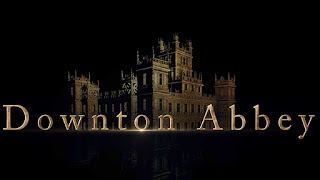Downton Abbey (Dir Michael Engler, 2h 2m)
There is an old and overused curse which any number of classic television series, from The Inbetweeners to The X-Files eventually finds itself succuming to: (Six Seasons and) The Movie. Downtown Abbey, a series focusing on the exploits of a minor aristocratic family, and their place, and that of the servants below stairs, is no different; yet, Downton Abbey's cinematic outing, in which the Royals come to visit, is a low stakes, low energy, and strangely sycophantic affair for a series that has not only a history for broad and dramatic turns, but which thrives on its exploration of the collision between classes, and between the traditional and burgeoning modernity.
With a royal visit by King George V (Simon Jones) and Queen Mary (Geraldine James) to Downton Abbey, occupying the Crawley family, and their servants downstairs, so the film explores the small army of major characters' problems, from the power struggle downstairs between the family butler, Barrow (Robert James-Collier), and his predecessor Carson (Jim Carter), to the family's son-in-law Tom believing that, as an Irish Republican, he is being investigated by the Royal Household before they visit, only to uncover something altogether more disturbing being concocted, as these problems, and their solutions, wind in and out of the Royal Visit.
By now, the majority of the cast are well-rounded figures-although with six seasons of development, one feels that they rather have to be; chief among these are Mary, the daughter of Earl Grantham, whose narrative arc is tied very much into that of Downton itself, as she tries to decide whether the family should move to smaller grounds and thus abandon Downton, their ancestral seat for centuries. Alongside her is the family matriach, Violet, played by Dame Maggie Smith, who not only seems to be having a whale of a time playing Violet as a sharp, and snappy, if elderly figure, whose narrative arc not only takes Tom into account, but also the battle for another ancestral seat with an estranged relative. Alongside this, there are a great number of other little plots clicking alongside each other
Yet, perhaps the thing that most hamstrings Downton: The Movie is simply that, for a two hour film in which all these plots intersect, including the main plot, nothing seems to happen. A plot in which the kitchen staff feel usurped by the King's kitchen-staff fizzles out in a strangely muted scene, whilst an elongated moment in which a couple of characters in short manage to inspire the other into following their dreams feels so matter-of-fact, its impact only arrives several scenes later. The problem in short is that this is still plotted like it's a television show, rather than anything resembling, even in plotting, a film.
This carries on, unfortunately, into the visual aspect of the film-at best it looks like a well-budgeted TV movie. At points, the film does do something visually neat-for example, its atmospheric opening in which we track a letter from Buckingham Palace to Downton itself-but too many times, it looks simply like the entire film has been shot with slightly better cameras-there are so many shots where something visually interesting could, but has not, been done, whilst cutting is lethargic at worst, and unhurried at best. It, in short, is visually boring.
One is thus left with the big question; in a film in which nothing much happens, in a rather unexcitingly shot way, where some of British acting's establishment figures basically sit around to talk about any one of the myriad uninteresting strands of plot drifting by, where is the point of the film? This is, after all, to be brutally honest, a TV movie or Christmas special, on steroids, and as its fizzles out, in a neatly tied off series of plotlines, one is left thinking: what, precisely, is the point of the Downton Abbey film
Rating: Neutral



Comments
Post a Comment